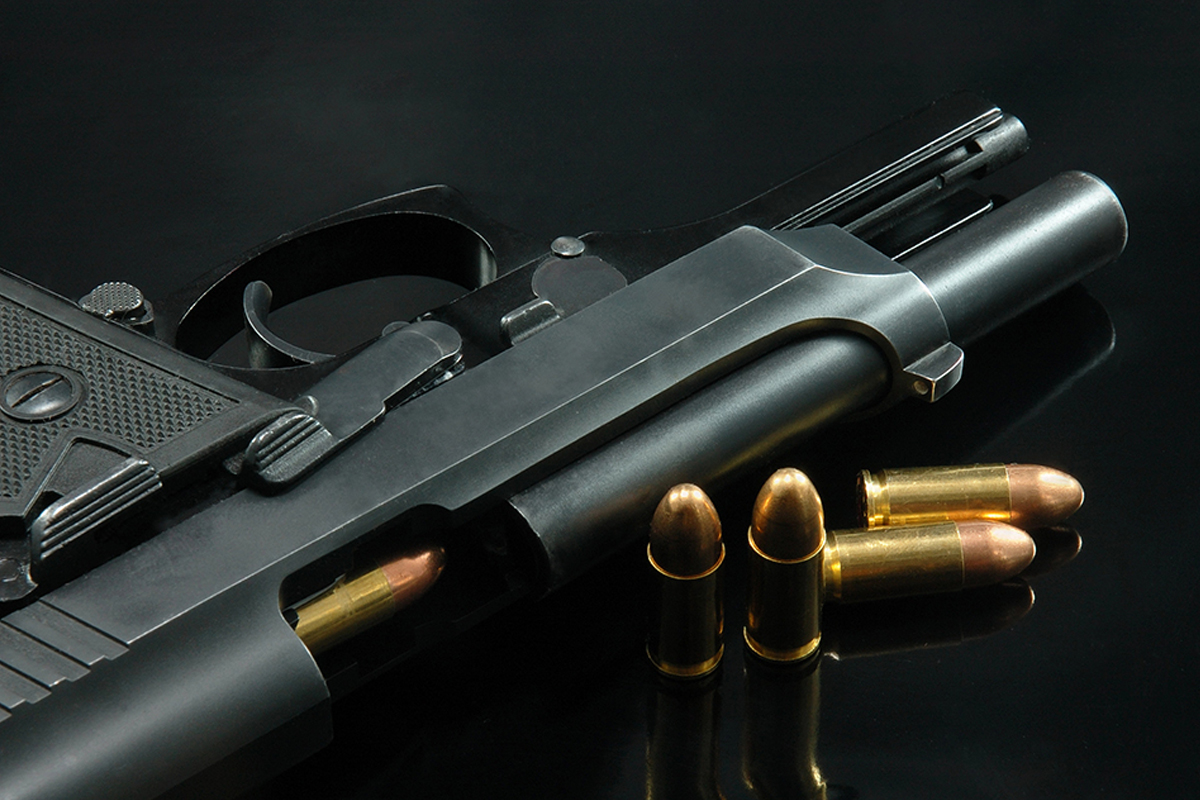If you are facing firearm charges, you need a criminal defence lawyer in Calgary to look at your case as soon as possible.
Gun offences include having, storing, transporting, or using firearms in an illegal way.
Most gun crimes are hybrid crimes, which means that the Crown can choose to proceed with a summary conviction or an indictment, depending on how serious the crime is. This choice has an effect on the possible punishments. For instance, if someone is charged with having a gun without permission, they could go to jail for up to five years if they are charged by indictment or two years if charged summarily. Learn more about the potential consequences on our Jail Sentence in Calgary page.
If someone is charged with having a gun without permission, they could go to jail for up to five years if they are charged by indictment or two years if they are charged summarily. For a first offence of possession of a prohibited firearm with ammunition, the minimum sentence is three years in prison when the case is brought by indictment. More details on sentencing can be found in our article on Criminal Sentencing Calgary.
If you are found guilty of a firearm offence, you could be banned from owning guns for years or even the rest of your life. Convictions for firearm offences also leave a permanent criminal record that can make it harder to travel, get a job, and more.
Strategic Criminal Defence is a top Google-rated criminal defence firm in Calgary, with over 500 5-star reviews. Our firm, and our experienced legal team, have defended clients in over 10,000 criminal cases. Leveraging our extensive network of lawyers and decades of experience, we craft defence strategies to help those accused of firearms offences beat the charge.
The lawyers at Strategic Criminal Defence are both highly experienced and dedicated to defending your rights and future in the face of these charges. Contact a lawyer today by calling (403) 719-6410 or visit our Contact Us page.
Key Takeaways
- Firearm offences include illegal possession, improper storage, carrying without permission, and trafficking firearms.
- Most gun charges are hybrid offences. This means that the Crown can choose whether to prosecute them as summary or indictable offences based on how serious they are.
- Penalties are harsh; even just having something without permission can get you up to five years in prison.
- Some gun crimes have minimum sentences that must be served, especially those involving weapons that are illegal or restricted.
- Most of the time, bail conditions require you to give up all of your guns, stay away from weapons, and check in with the police on a regular basis.
- If there are violations of Charter rights or problems with search warrants, these charges can be beaten with the right legal defence.
- Defences could be having the gun legally, not knowing about it, the police not following the right procedures, or arguing about who owns or controls the gun.
How Our Lawyers Help With a Firearms Charge
A Strategic Criminal Defence lawyer can help from the moment you are first charged.
- Before charges are filed, we can give you legal advice on how to protect your rights during the investigation and how to handle police questioning.
- We can help you not say anything unnecessary that could make the case against you stronger. We can help you deal with the police in any way you need, including telling you when to be quiet and when to work with them.
- We can also hire experts to look into the Crown’s evidence about the type of weapon or how it works.
- Our lawyers will look for mistakes in search warrants, see if the police followed the Charter, and look at forensic evidence like fingerprints or DNA on the weapons.
- We can cross-examine police witnesses, ask questions about how the searches were done, and make legal arguments about who had possession, knowledge, or control of the guns in question.
Examples of Firearm Offences
In Calgary, you could be charged with a gun crime for any of the following:
- Police find a loaded gun in a car during a routine traffic stop. The handgun is a restricted firearm, and even though the person has a valid Possession and Acquisition Licence (PAL), they don’t have an Authorization to Transport (ATT) the gun or a safe place to keep it when it’s loaded. This could get you in trouble for having a loaded gun that isn’t allowed.
- While looking for something else in a home, police find a shotgun without a trigger lock and ammunition that is easy to get to in a closet. The person who lives in the house doesn’t have a licence to own a gun. This could get you in trouble for having a gun without permission and keeping it in a dangerous place.
- A person legally owns hunting rifles, but after a fight at home, the police come and give them an emergency protection order.
Consequences of a Firearms Charge
If you are accused of a gun offence in Calgary, it could have a significant effect on your life for a long time.
The type of gun (non-restricted, restricted, or prohibited) and the offence itself will determine the penalties.
- Most crimes that involve guns are hybrid offences. This means that the Crown prosecutor can either file a summary offence against someone for a less serious case or an indictment for a more serious case.
- For basic unauthorized possession of a non-restricted firearm, if prosecuted by indictment, you could face up to 5 years in prison. If prosecuted summarily, the maximum is 2 years. There is no mandatory minimum sentence for this offence.
- There are minimum sentences that must be served for more serious crimes. For example, possession of a restricted or prohibited firearm with ammunition carries a mandatory minimum sentence of 3 years for a first offence if prosecuted by indictment. For a second or subsequent offence, this increases to 5 years minimum. If proceeded summarily, there’s a minimum 1-year sentence.
- Trafficking weapons is one of the most severe offences. It has mandatory minimums of 3 years for a first offence and 5 years for subsequent offences, with maximum penalties up to 10 years.
- The court will also give you a weapons prohibition order, which means you can’t have any guns, bullets, or other weapons. This order can last for the rest of your life.
- You will also have a criminal record that will follow you for the rest of your life. Because of this, it can be hard to find a job, travel to other countries, and find a place to live.
Firearm Offence Charge Defences
Gun charges in Calgary can be challenging to face. However, there are a number of legal defences that might apply to you. Our lawyers can look at the details of your case and figure out the best way to protect your interests.
Here are some possible defences:
- Charter: The Canadian Charter of Rights and Freedoms says that you can’t be searched or seized without a good reason. You also cannot be held without a good reason. If the police searched your house, car, or person without a good reason, or a proper warrant, the collected evidence may be impacted.
- If you can show that you were allowed to own the gun in question, you may have a defence. This could include multiple options: such as, showing that you had a valid Possession and Acquisition Licence (PAL), a registration certificate for restricted firearms, or an Authorization to Transport (ATT).
- A lot of the time, the Crown has to show that you knew you had the gun. You might have a defence if you can prove that you didn’t know the gun was there or that you didn’t have control over it. You might not legally own a gun if someone else put it on your property without your permission or if it was found in a car or house that other people could get to.
Firearm Offence Charge Investigation
When Calgary police look into gun offences, they follow certain steps to get evidence for their case.
- There are many ways that police can start these investigations. For example, they might stop someone for a traffic violation, get a call about someone acting suspiciously, be looking into another crime, or get a tip from the public.
- When the police think someone has committed a gun crime, they usually ask for search warrants for their homes, cars, or electronics. These warrants need to be very clear about what proof they want and why they think they will find guns. When police officers find guns, they document where they found them, what condition they were in, whether they were loaded, how they were stored, and if there was ammo nearby.
- The police will take the guns and send them to forensic labs to be tested. Experts look for fingerprints or DNA, check to see if the weapon works, and figure out what kind of weapon it is (non-restricted, restricted, or prohibited). They’ll also run the gun’s serial number through databases to see if it was stolen. They can also look to see if the firearms were used in other crimes.
- The police will check their database. They can see if you have the right permits for the guns they found. They will talk to people who may have seen you with the guns and look through your phone records or social media to find proof that you knew about the guns.
If the investigation finds enough evidence, formal charges will be brought.
Bail Conditions for Firearm Offence Charges
If you are charged with a gun crime in Calgary, the court will usually set strict bail conditions for you if you are released while you wait for your trial.
- The most important part of your bail conditions is that you can’t have any weapons. Not only guns are banned. It also includes things like pepper spray, crossbows, and knives. You are likely also required to immediately turn over all of your guns (and/or other weapons) to the police.
- The court will probably tell you to stay away from gun shops, hunting stores, and shooting ranges, which are all places where guns and ammo are sold or stored.
- You will probably have to check in with a bail supervisor or probation officer regularly, for example, once a week.
- If you are charged with a more serious gun crime, especially one that involves violence or gang ties, you may have to stay home or follow strict curfew rules. This could mean that you can only leave your house for certain reasons that have been approved, such as going to work, seeing a doctor, or going to court.
- If you have gun charges, you may not be allowed to talk to anyone who was also charged in relation to your crime, has a criminal record, or is involved with a gang.
- The court might also take your passport away so you can’t leave the country. If you move, change jobs, or change how to get in touch with you, you need to let your bail supervisor know.
If you break any of these bail conditions, you will be charged with a new crime and lose your bail. Then, you will be sent to jail until your trial.
For more information, visit our page on The Bail Hearing Process in Calgary.








